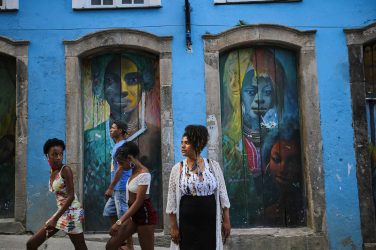You have probably already stumbled upon a Brazilian meme on one of your internet searches and didn’t even know it. Do you know the one with the confused blonde lady with complicated formulas in the background? That’s a Brazilian meme.
Brazil ranks as the fourth country with the highest number of internet users in the world. Portuguese is Brazil’s only official language and the majority of its population do not speak English.
While most of the internet is decidedly Anglophones, Brazilians have carved out a large Portuguese-speaking digital territory of their own. And they mainly use it to speak on their own terms — which means, a lot of memes.
The truth is, in order to understand anything about Brazil in 2017, from soap operas and daily news, to politics and the economy, you must take a look at its memes.
Brazil takes its memes so seriously that the country launched the 1st Meme World War against Portugal in 2016, after finding out that a Portuguese Twitter user had appropriated a dearly loved meme.
Even though memes from any culture can be difficult to explain to outsiders, Brazilian researcher Gabriela Lunardi embraced the challenge.
She is a research student at QUT Digital Media Research Centre in Australia and is currently working on a project that, as she explains, “tries to understand why Brazilian memes are different from other memes, how they express specific aspects of Brazilian culture, and why they matter.”
“Brazil is very active on the internet, not only because of the number of users, but also because Brazilians have a very specific way of behaving online. […] Brazilians don’t care if you don’t understand their language and their jokes, they will talk to you as if you were Brazilian”, Gabriela says in an essay about former Brazilian singer and dancer Gretchen — aka the queen of memes, in Brazil — who recently starred in Katy Perry’s Swish, swish lyric video.
We talked to Gabriela to understand “why Brazil’s memes matter”.
Why have you decided to study memes in your dissertation?
My final paper for my undergrad studies was about a YouTube channel called “Porta dos Fundos” [“Backdoor”, a Brazilian comedy-sketch channel]. I loved studying the Brazilian internet, so I’ve decided to go deeper into the relationship between humor and online Brazilian culture.
I’ve always thought that Brazilian memes were wonderful. They say so much about Brazil, and this became even clearer after I moved to Australia and found out that Australians have a completely different sense of humor and had trouble understanding ours.
How do Brazilian memes differ from other countries’ memes?
Each country or region has different memes that reflect their own culture. Brazilian memes portray the Brazilian people and how we deal with popular culture, politics and social reality.
They are amazingly difficult to understand, for those seeing them from the outside, because we have this unique way of talking about our problems through humor.
A saying that I really like to mention to those who are not Brazilian is that “we laugh so we don’t cry”. I think it perfectly describes our unique way of making humor.
How do you describe this unique Brazilian language?
Self-irony. While we criticize our problems as a country and our behavior as a society, we also make fun out of it, as if laughing were the only way to face such a reality. Our memes present themselves as genuinely Brazilian because they are paradoxical and complex, just like our own culture. When we laugh at Brazil’s expense, it is as if we were both ashamed and proud of being Brazilian.
What are the challenges of translating Brazil’s memes to other contexts?
One of my greatest challenges was to try to “translate” our memes culturally. The biggest difficulty is that some memes only make sense if you are Brazilian – and those were the most interesting to me.
So, in my dissertation, I delved into a little bit of Brazil’s history and tried to explain our culture before trying to explain our memes. I’ve also tried to find comparisons with Australian culture and chose to discard those that were too culturally specific.
How did Brazil’s meme culture begin?
There are no official records of “Brazil’s first internet meme”. Actually, scholars do not have a general consensus for when the word “meme” began to be used on the web.
Originally, this word comes from a 1976 theory by biologist Richard Dawkins in which he defines “meme” as a transference of ideas from person to person, through repetition.
On the internet, a meme is an idea, phrase, image or video that keeps repeating and changing itself. That’s why Brazil was already a meme producer way before the internet, with popular rhymes that kept changing over time or catch phrases from soap operas that are used in real life in different contexts.
One of the first successful Brazilian memes online was “Tapa na Pantera” [“slap on the panther”, meaning taking a hit off a joint], from 2006, that had several parodies, a funk version and excerpts that turned into punch lines.
How do memes drive change in the overall Brazilian culture?
Memes are helping us build our cultural identity, which is extremely complex and abstract. Memes that satirize political scandals of the past few years illustrate how Brazilians face their country’s problems and their own political views.
When “we laugh at the disgrace”, we are expressing ourselves in the most Brazilian way possible. This way of facing problems may not be new, but network communication can turn it into a portrait of Brazilian reality. It’s as if specific language, use of humor and behavior define what it is to be a Brazilian on the internet.
This also makes Brazilian internet users recognize themselves as being part of the same culture, no matter how different their political and social opinions are.
In your article about Gretchen, you mentioned how some international pop stars have embraced Brazilian memes. Is this common to observe with other countries’ memes or are Brazilians masters of the internet I’m-messing-with-you kind of thing?
Yes, Brazil is conquering more space online. Today, we are the fourth country in the world with the largest online presence and — more than having a high number of users — we are VERY active online, especially in social media. Our memes are, undoubtedly, a source of national pride.
Brazilians insist on sharing them with the “gringos” (slang for foreigners), an attitude that is also part of our cultural identity. Brazilians are increasingly being perceived as part of an internet that is intensely dominated by the United States. This happens, mainly, when Brazilian memes are validated by US culture, such as the case with Gretchen performing in the Katy Perry music video.
If you could define Brazil with one meme, which one would you choose?
Mission impossible! Not even if I organize a meme catalog, would I be able to define such a unique and complex country. But there is a comment (not a meme specifically) that I think says a lot about how we use humor to criticize Brazilian issues while, at the same time, building our cultural identity.
I think it perfectly shows this paradox of having shame and pride at the same time, something that is in our meme DNA. It’s the reply of a Brazilian girl to Azealia Banks, who was so annoyed by the bombing of replies in Portuguese she received after criticizing Brazil.
Azealia wrote: “I didn’t know they had internet in the favela”. Débora’s answer couldn’t have been more Brazilian than this.
Singer Azealia Banks got into a fight with Brazilians on Facebook (and allegedly had her account suspended) after calling them “third world freaks”. This was Débora Oliveira’s reply: “Here we have internet even in prison, my love”.
Fernanda Canofre is a journalist, with a master’s degree in History. She was born in southern Brazil. While wandering around, Canofre uses reporting as an excuse to listen to people and to tell stories about all types of people.
This article appeared originally in Global Voices – https://globalvoices.org/














